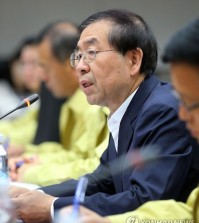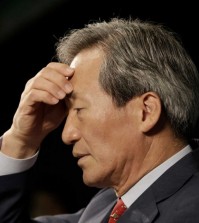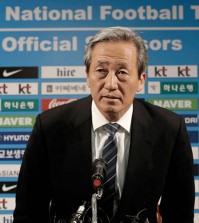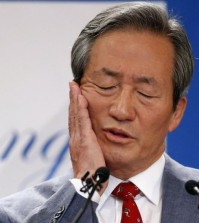- California Assembly OKs highest minimum wage in nation
- S. Korea unveils first graphic cigarette warnings
- US joins with South Korea, Japan in bid to deter North Korea
- LPGA golfer Chun In-gee finally back in action
- S. Korea won’t be top seed in final World Cup qualification round
- US men’s soccer misses 2nd straight Olympics
- US back on track in qualifying with 4-0 win over Guatemala
- High-intensity workout injuries spawn cottage industry
- CDC expands range of Zika mosquitoes into parts of Northeast
- Who knew? ‘The Walking Dead’ is helping families connect
Park Won-soon, Nam Kyung-pil on the rise as presidential contenders
By Kang Seung-woo
South Korean elections last week have determined the fates of the rival parties’ potential presidential hopefuls.
High-profile politicians ran in the local elections in unprecedented numbers, thus providing everyone a glimpse into how the 2017 presidential campaign might pan out.
Seoul Mayor Park Won-soon of the main opposition New Politics Alliance for Democracy (NPAD) has become the biggest winner of the elections after successfully defending his post against ruling Saenuri Party candidate Chung Mong-joon.
The re-election has established him as arguably the front-runner in the next presidential election given that the mayorship carries extra weight in Korean politics and it is often regarded as a strong springboard to the presidency. Former Seoul Mayor Lee Myung-bak was elected president in 2008, running on his accomplishments as the top administrator of the city.
Although Park said he would not run for president once winning re-election ― his mayoral term will run through 2018 ― the presidential election is three years away and his presidential bid may pick up momentum in the meantime.
Conversely, Chung, a former seven-term lawmaker, saw his reputation hit hard as the ruling party’s leading presidential candidate.
The former FIFA vice president had a plan to make a steppingstone of the mayor post, but he is now in no mood to talk about the presidency because he failed to present a political vision.
Inevitably, the defeat is likely to demote Chung to a fringe group within the party for the present time, but he is expected to watch for an opportunity in order to bounce back.
Reform-minded Saenuri lawmakers Nam Kyung-pil and Won Hee-ryong also made their cases for the presidency after winning the governorship in Gyeonggi and Jeju Provinces, respectively.
Edging NPAD’s experienced candidate Kim Jin-pyo by less than one percentage point in the gubernatorial race of Gyeonggi Province, Nam has added another line on his resume, which already features his five-time Assembly membership.
Given that the governorship also has extra significance in political circles, or as a steppingstone for the presidency along with the Seoul mayorship, he has clearly gained a foothold for a possible presidential bid.
As for Won, the Jeju native triumphed in his hometown to resurrect his career which has been down since he dropped out of the general elections in 2012.
Hong Joon-pyo of the Saenuri Party was re-elected as the governor of South Gyeongsang Province to cement his billing as a potential presidential contender.
Inside the NPAD, Ahn Hee-jung, who retained his governor position of South Chungcheong Province, has consolidated his status as a rising competitive candidate for the presidential election, but Song Young-gil, who failed to fend off the challenge of the Saenuri’s Yoo Jeong-bok in the Incheon mayoral race, saw his hopes for the presidency dashed.
Kim Boo-kyum did not pull off an upset in Daegu ― a strong Saenuri Party stronghold and hometown to President Park Geun-hye ― but he garnered 40.3 percent support - the highest ever cast for an opposition party’ candidate. He also ran in the 2012 general elections in the city and received an approval rating of more than 40 percent.
Thanks to his series of challenges, he is now seen as bonafide representative of the opposition party in Daegu and North Gyeongsang Province.

















